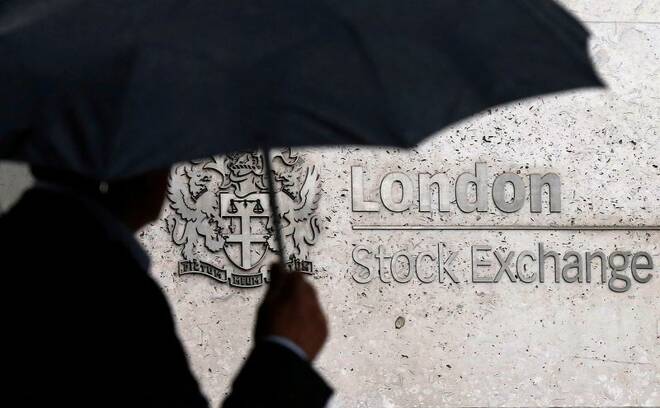Advertisement
Advertisement
UK shares drop as inflation spikes to 40-year high
By:
(Reuters) - UK shares fell more than 1% on Wednesday after the country's inflation accelerated to a 40-year-high, adding further pressure on the Bank of England to raise interest rates, while falling crude and metals prices sent commodity-linked stocks tumbling.
By Anisha Sircar and Boleslaw Lasocki
(Reuters) – UK shares fell on Wednesday after inflation in the country touched a 40-year-high in May, adding further pressure on the Bank of England to raise interest rates, while falling crude and metals prices sent commodity-linked stocks tumbling.
The blue-chip FTSE 100 index fell 0.9%, while the domestically focused mid-cap FTSE 250 index declined 0.3%.
Soaring food prices pushed UK consumer price inflation to 9.1% — the highest rate out of G7 countries and underlining the severity of the cost-of-living crunch.
“The pressure is now on the Bank of England to apply much cooler compresses in the form of successive rate rises over the next few months to reduce demand and bring down prices,” said Hargreaves Lansdown analyst Susannah Streeter.
Britain’s main indexes were on pace to end the month between 6% and 7% lower as investor confidence tumbles on rising worries of an impending recession.
The Bank of England last week announced a quarter point rate hike to 1.25% and said it was ready to act “forcefully” to stamp out inflation dangers.
Miners and energy stocks were the biggest drags, falling 5.5% and 3.3% respectively as industrial metals and crude prices plunged.
Shares of NatWest Group jumped 3.0% after the British government said it was extending a trading plan to help sell down the taxpayer’s stake in the British lender by another 12 months.
Harbour Energy slid 2.8% after the oil and gas producer told the government that Britain’s planned windfall tax on the energy sector would shrink the company’s investment in the country.
Meanwhile, Britain is becoming a more closed economy due to Brexit, with damaging long-term implications for productivity and wages, a study said.
(Reporting by Boleslaw Lasocki, Anisha Sircar and Amal S in Bengaluru; Editing by Uttaresh.V and Alison Williams)
About the Author
Reuterscontributor
Reuters, the news and media division of Thomson Reuters, is the world’s largest international multimedia news provider reaching more than one billion people every day. Reuters provides trusted business, financial, national, and international news to professionals via Thomson Reuters desktops, the world's media organizations, and directly to consumers at Reuters.com and via Reuters TV. Learn more about Thomson Reuters products:
Did you find this article useful?
Latest news and analysis
Advertisement
